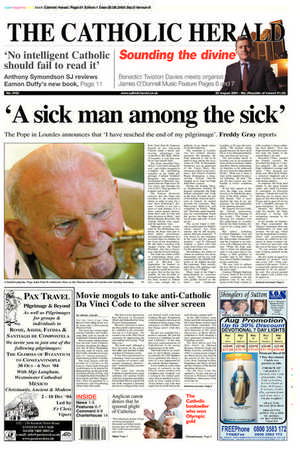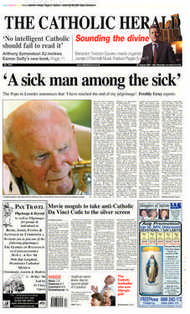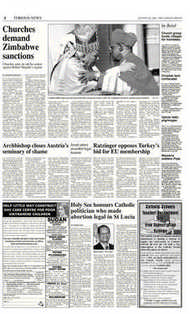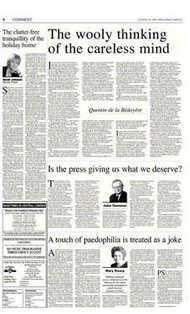Page 1, 20th August 2004
Page 1

Report an error
Noticed an error on this page?If you've noticed an error in this article please click here to report it.
Tags
Share
Related articles
France Prepares For Visit Of German Pope
Two Years In A Hard Job ...
Romero Should Be Beatified, Says Benedict Xvi During...
Vatican
A Pope Comes To Our Lady's Shrine At Lourdes
‘Asick man among the sick’
POPE JOHN Paul II, Supreme Pontiff of the Universal Church, made a heroic and moving pilgrimage last weekend to the Holy Shrine of Lourdes, a visit that may be his last outside Italy.
The Pope described himself as “a sick man among the sick”, and visibly struggled to complete the demanding schedule of his 104th pilgrimage. Cardinal Godfried Danneels, the outspoken Archbishop of Brussels, suggested that the Pope knew he was dying and intended his visit to be a “final goodbye to Lourdes and to life”.
The Vatican dismissed rumours that the Pope had travelled to the miraculous shrine in order to pray for a cure from Parkinson’s disease. “Lourdes is not just a place to seek healing, it is a place where people demonstrate their faith in God and their devotion to Mary,” said Bishop Renato Boccardo, the Vatican official who organised the apostolic visit.
Although severely weakened by his debilitating condition, the Pope took part in three public ceremonies, including the celebration of a two-hour Mass on Sunday for the Feast of the Assumption. He also held a meeting with Jacques Chirac, the French President, and had a discussion with the French bishops.
The Pope has made a habit of confounding those concerned by his health. During a visit to Slovakia last September, he looked so unwell that many observers thought he would never travel again. But in the last two months, he has travelled to Switzerland and Lourdes. He has been invited to Ireland next year, though this is unlikely to go ahead unless his health improves.
The weekend at Lourdes was not without anxious moments. On Saturday, the Pope appeared to slip as he knelt to pray before the cave, where in 1858, St Bernadette Soubirous saw an apparition of the Virgin Mary. His entourage rushed to his assistance, and French Cardinal Roger Etchegaray, a longserving Vatican official, stepped in to read out Pope John Paul’s speech.
During the Sunday Mass, as temperatures reached 30 degrees centigrade, the Pope looked exhausted and weak in the heat. Towards the end of his homily, which he delivered in French, he turned towards his assistant, Mgr Mieczyclaw Mokrzyck, and whispered in Polish: “Help me!” But then, rather than letting his concelebrants finish the service, the Pope took a sip of water, and said: “I must go on.” The crowd found it difficult to understand the Pontiff, whose speech was often slurred, and he left lengthy pauses between sentences. “I was struck by the weakness in his voice and his general fragility,” said Fr Edouard Tognan, a priest who had come from Africa to Lourdes for this apostolic visit.
Nevertheless, his ability to charm an audience has never diminished, and he was well supported by the 300,000 pilgrims as he battled through the ceremony. They encouraged him with applause and cries of “Viva il Papa!” Many wept at the Pope’s determination to overcome his frailty. “He is someone who pushes himself to the limit,” said Guillaume Langlois, a 25-year old seminarian. “He inspires young people because he faces up to life as it has been presented to him, and does not give up.” The prevailing mood at Lourdes was of an emotional farewell between Holy Father and Holy Shrine, particularly on Saturday as he addressed the sick from the Massabielle Grotto. “With you I share a time of life marked by physical suffering,” he said. “Yet not for that reason any less fruitful in God’s wondrous plan.” In his first speech at the cave, the Pope was clearly moved as he beheld the spectacle of the Holy shrine. “I feel deeply that I have reached the end of my pilgrimage,” he said poignantly in his opening remarks.
Dr Joaquin Navarro-Valls, the Vatican spokesman, played down the meaning of the words. “The Pope is showing his emotion over this pilgrimage to Lourdes that he has been looking forward to for a long time,” he said.
But others, including Cardinal Danneels, were not so sure. “The Pope’s health has deteriorated immensely,” said the Cardinal in an interview with a Belgian radio station. “When the Pope said: ‘this is where my pilgrimage ends’ it can mean one of two things: a final goodbye to Lourdes and to life. That’s how most Catholics interpreted the comments.
“He may wish to address the fact that he is aware that the end is nigh.” Cardinal Philippe Barbarin of Lyon, head of the French bishops’ committee for the pastoral care of the sick, spoke of the Pope’s ability to offer comfort to those suffering from illness. “Now the Pope himself needs this comfort from the hands of the eternal Mary,” he said.
President Chirac greeted the Pontiff warmly. He described the Pope as “a tireless pilgrim”. He said the Pope embodied courage and spirit. “This strength has made you, Most Holy Father, a universal shepherd and a man of peace,” he said in his welcoming address.
In response, the Pope paid tribute to the great French saints, and called on France to remember its Christian heritage. “I thank the Lord for allowing me to return once again to this beloved land of France and to greet all of you with a heartfelt message of grace and peace,” he said.
Despite the difficulties with his health, the Pope delivered a strong and resounding message to his audiences.
In his homily on Sunday, the Pope expounded the Vatican’s statement about the collaboration of men and women. “In our age, which has the temptations of materialism and secularisation, women are called to be witnesses to those essential values which are seen only with the eyes of the heart,” he said.
“To you women falls the task of being sentinels of the invisible.” He also made an appeal to mankind to protect “each and every life”, from conception to the grave. “Life is a sacred gift, and no one can presume to be its master,” he said. The crowd greeted this appeal with a loud roar of approval.
blog comments powered by Disqus















